Opinion
Fearful leader to tearful father
The resounding power of pain must inspire everyone to reconcile with the past
Shambhu Ram Simkhada
In the fascinating book, What If by Robert Cowley, the world’s leading historians imagine what might have been different from what we see today if a certain event had or had not happened. In one such scenario, Cecelia Holland, in the chapter ‘The Death That Saved Europe’, describes how in the 13th Century, Mongol conquerors had reached all the way to Vienna, Austria and the Adriatic, defeating one Christian Army after another on the way. The Mongols were in the process of establishing the largest connected Land Empire in the history of the world. But in early 1242, the brilliant Mongol General Sabotai, on the brink of his final assault on Europe, decided to drop the conflict and return home after the sudden news of the death of Ogadai, the intelligent and kind-hearted third son of Emperor Genghis Khan. The death, which undoubtedly altered the course of history, played a prominent role in shaping the Mongol conquerors’ consequent political approaches. The book’s consideration of important personal events in its evaluation of historical scenarios prompted me to assess the role of personal tragedy in shaping Nepal’s own history.
War, peace, politics or nation building are collective endeavors but individual leadership is crucial. Can today’s United States be understood by ignoring the roles played by George Washington and Abraham Lincoln, modern India by excluding Mahatma Gandhi or Subash Chandra Bose or China’s present rise without considering the roles of Mao and Deng? Leadership roles basically explain why one man’s statesmanship turned a fishing village into a prosperous modern nation-state (Singapore) just as why some countries in similar geo-political settings but with much less natural and human resources become gardens of peace, prosperity and democracy (Switzerland) whereas others languish in more poverty and chaos (Nepal).
In the discourse of political leadership in Nepal’s context, the names of leaders that come to mind since unification under Prithvi Narayan Shah include: Jung Bahadur Rana, B. P. Koirala, King Mahendra, G. P. Koirala, Madan Bhandari, Ganesh Man Singh, Krishna Prasad Bhattarai, Man Mohan Adhikari are some prominent ones. Among the living, some may adore, others despise, but all have to acknowledge: the role of Pushpa Kamal Dahal, Prachanda in changing the course of modern Nepal’s history. From unification to a long saga of national self-annihilation, where is the current transition taking Nepal? That, of course, is a matter of separate discourse.
Enduring pain
During the days of the Maoist insurgency, ‘Prachanda’ instilled fear in most Nepali minds. Some now regard him as a villain but it is worth asking: where would Nepal be today without G. P. Koirala leading the mainstream political parties and the international community in the restoration of peace and democracy and Prachanda convincing his cadres and fighters to give up the guns and unite for a peaceful settlement? Since then, Prachanda has been one of the most powerful figures in Nepali politics.
And then one year ago, Nepali hearts were touched by the scene of the same commanding and powerful Prachanda standing as a tearful father in front of the lifeless body of his son, Prakash. My wife and I watched the last rites of Prakash Dahal with heavy hearts and tearful eyes. Like many others, I expressed condolences to the Dahal family then and recently visited their residence to convey my prayers.
There is no bigger pain in the life of parents than losing grown up children. This is an unimaginable kind of pain—one that nobody except those who have had to endure the tragedy themselves can feel. Many come to offer their condolences but the only way parents can endure the unbearable pain is through their own mental strength and love and support from each other. I remember the day I first came face to face with ‘Prachanda.’ I attended his swearing-in ceremony after his party became the largest in the first Constituent Assembly (CA) and he became the world’s first popularly elected Maoist Prime Minister. I also met Sita and Prakash Dahal. Later, I became a member of the Technical Committee of the Special Committee for the Integration and Rehabilitation (I&R) of the Maoist Army Combatants (MACs), which, as Prime Minister, Prachanda chaired.
It was not an appointment of my choice. So, I ventured to that first meeting in the PM’s office in Singha Durbar filled to the brim with reluctance and ambivalence. The PM not only convinced me to continue but also inspired me to make valuable contributions to the successful I&R of the MACs. The formula, numbers, norms, modality and rank, on which political parties finally agreed, were essentially mine. Thus Nepal presented a new model of transforming violent conflict into peaceful competition for power. Had I&R failed, then God knows where Nepal would be now?
Successful implementation of the Constitution promulgated by the second CA after the first one failed, remains challenging. Transitional Justice (TJ) has been the weakest part of Nepal’s peace process and political transitions. Delayed establishment and disappointing progress in the two Commissions—Truth and Reconciliation and the Commission for the Investigation of Enforced and Disappeared Persons—have kept victims’ grievances unaddressed and have allowed impunity to continue. Our lack of progress in this endeavour reflects the internal and external complexities teasing the wisdom and courage of Nepali leaders who are struggling to manage the political transition. Can those presiding over changes in Nepal’s history sustain the current course or avoid another conflict, risking an even more painful change of geography?
The power of pain
As he stood in Aryaghat with a flame in hands and tears in eyes last year and, similarly, choked while talking about his son just a few days ago, Prachanda must have realized, that despite all the power and wealth, man is impotent in front of the superior power of time, nature, God, or whatever you call it. The pain he felt during Prakash’s untimely death might have also encouraged him to empathise with others who lost their sons and daughters in the triumph and trauma of transition—a period in our history in which he resided as one of the key players. A few days ago, during the ceremony marking one year since his son’s death, rather than listening to other politicians’ speeches, I wished Pushpa Kamal Dahal had the wisdom and courage to share his pain with victims who have lost loved ones in national conflicts.
Death, while unbearably painful, can also make a father realise the brevity of life and the futility of ambitions and hence resolve to make sacrifices. Turning pain to power, can the tearful father transform himself from a mighty and powerful leader to an admired statesman with hopes to bring divided and disappointed Nepalis together in reconciliation? Despite past wrongs and present differences— can he bring them all together to create the foundation for a peaceful, tolerant, stable, prosperous and democratic Nepal for all? The resounding power of pain must inspire everyone to realise and reconcile with past and present realities—forgive and forget—so that society can collectively move forward, avoiding even greater pain in the future.
Simkhada is a former Nepali ambassador to Switzerland and chairman of the Association of Former Nepali Ambassadors. He can be reached at [email protected].




 20.06°C Kathmandu
20.06°C Kathmandu










